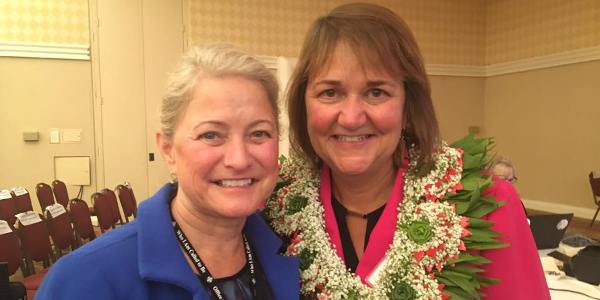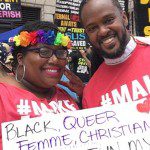
Some United Methodists are overjoyed about the election of Karen Oliveto, our first openly queer bishop. Others are very upset about it. Those who are upset about it tend to be upset for two reasons. Conservatives think being a “practicing homosexual” is sinful. Moderates think any changes that happen to United Methodist polity need to follow the protocol of our General Conference process. I’ve spent most of my time responding to the first concern. What about the second concern? Should gay United Methodists who are called to ordained ministry either do something else with their lives or switch to a different denomination out of respect for the institution of United Methodism? Ecclesial disobedience is certainly a different thing than civil disobedience. Is ecclesial disobedience ever valid?
The Bible is filled with examples of people defying the religious authorities of their day. In retrospect, we know who was on the right side from the perspective of our biblical canon. For many conservative evangelicals, we’re not allowed to make analogies between our day and what people did in the Bible because the lives of the characters in the Bible have been canonized. Why is it that we make the words of Peter and Paul authoritative but not what they actually did?
In Acts 5, Peter and John were dragged before the Sanhedrin religious council because they had been preaching about Jesus without authorization:
The high priest questioned them, saying, “We gave you strict orders not to teach in this name, yet here you have filled Jerusalem with your teaching and you are determined to bring this man’s blood on us.” But Peter and the apostles answered, “We must obey God rather than any human authority. The God of our ancestors raised up Jesus, whom you had killed by hanging him on a tree. God exalted him at his right hand as Leader and Savior that he might give repentance to Israel and forgiveness of sins. And we are witnesses to these things, and so is the Holy Spirit whom God has given to those who obey him.”
As shocking as it may seem, the United Methodists who are pursuing the path that they call “biblical obedience” are not being cynical and insolent to use the word “obedience.” They actually believe that they are being obedient to God rather than human authority. Maybe they’re wrong, but that’s what they believe. Something happened in their lives which they interpreted as a sign from the Holy Spirit that gave them the conviction that choosing a more congenial, compliant course of action would be a betrayal of God. And the reason they use the word “biblical” is because there’s a whole lot of Bible other than the 3 or 4 anti-gay clobber passages which they’re drawing upon in their discernment.
I’ll never forget the day I stopped being a moderate. In my first year of ministry, I had sat down at a table at a clergy event with two female pastors. Somehow I ended up telling them my story of coming to United Methodism through a queer congregation. And I chuckled and said of course I couldn’t write anything about it in my commissioning papers. Then one of the women said why not and the pain in both of their eyes filled me with shame. God kept goading me with that moment until I began to share my story openly. Because he really did save me through that queer United Methodist church. And for me to say I got mine and just climb the career ladder of bigger and bigger United Methodist churches without ever disclosing where I came from would have been a betrayal of the queer people who showed me the gospel.
I have not discerned that God is commanding me to violate the Discipline and marry two queer people. But I do have queer students who are exploring a call to ministry, and I am encouraging them to pursue that call no differently than if they were straight. I’m not claiming to be able to discern with absolute certainty that clergy who violate the Discipline are doing so out of obedience to God. But we shouldn’t presume that the will of God cannot contradict the will of a majority of United Methodist General Conference delegates. We simply cannot speak with certainty either way.
I believe that our Discipline’s anti-gay stance is undermining our denomination’s ability to promote sexual holiness because of our entanglement with toxic culture war. Instead of a reactionary sexual ethic that was constructed as a backlash against the sexual revolution of the sixties, we need an articulation of holy sexuality that is aligned with the Wesleyan goal of perfection in love. I think the idolatry of traditional gender norms is a distracting stumbling block that gets in the way of articulating holy sexuality. I really hope that our denomination’s commission will actually be able to have a spirit-led conversation about this rather than fall into a political stalemate among people whose minds are completely made up. Every time in the past that our General Conference has empowered a commission to examine the issue, they have concluded in favor of changing our Discipline’s language and the subsequent General Conference has rejected their findings.
So why not wait till the commission rules to ordain openly queer clergy and consecrate an openly queer bishop? I understand the moderate perspective in the abstract. But I can’t imagine telling one of my queer students that they should go into a different career field and then perhaps pursue ministry after that only if the 2020 General Conference actually honors the findings of its sexuality commission this time around. If God calls people to ministry, they should follow that call. The institution of United Methodism is not more sacrosanct than the Holy Spirit’s call.
The way I’ve come to understand it is that the ecclesial disobedience is part of our discernment process, for better or worse. Those on the other side should determine if God is calling them to file charges in response. And our bishops should ask God how to respond to these charges in a way that best reflects the grace and truth of Christ. If our conversation doesn’t involve being confronted with openly queer Christians who are called to marriage and ordained ministry, we will not be able to adequately discern what God is doing. Discernment must involve personal stories that reveal the fruits of the flesh and the fruits of the spirit which illumine our interpretation of whatever scripture is analogously applicable to our context. It may feel “objective” to talk about an issue in the abstract, but that’s Enlightenment thinking, not biblical thinking.
The fact that the Bible is canonized does not mean that it is abstract, impersonal logic. Every word within it is somebody’s personal testimony. As 1 John 1:1 says, “We declare to you what was from the beginning, what we have heard, what we have seen with our eyes, what we have looked at and touched with our hands, concerning the word of life.” So when we include personal testimony in our discernment process, we are not being “subjective” in a way that contradicts the Bible’s “objectivity.” We are actually emulating how the early church sought the will of God in Acts 15. Part of determining whether queer clergy are “incompatible with biblical teaching” is to look at the ministry fruit of openly queer clergy.
Whether or not you agree with me, I urge you not to be consumed with anger and cynicism in response to Bishop Oliveto’s election. Pray about it. If God tells you to respond in some kind of way, then do so. Just remember that if you’re right, God is counting on you to speak with enough grace and humility that your words will not be easily dismissed. If you alienate people by being crass and self-righteous in your presentation of the truth, then you have betrayed God. My hope is that missional wisdom will prevail among our leaders and we will figure out a way of structuring the church that allows us to escape our gridlock and share the gospel each of us is given with the mission field to which each of us is called.
Subscribe to our podcast Crackers and Grape Juice!
Like my author page on Facebook!












